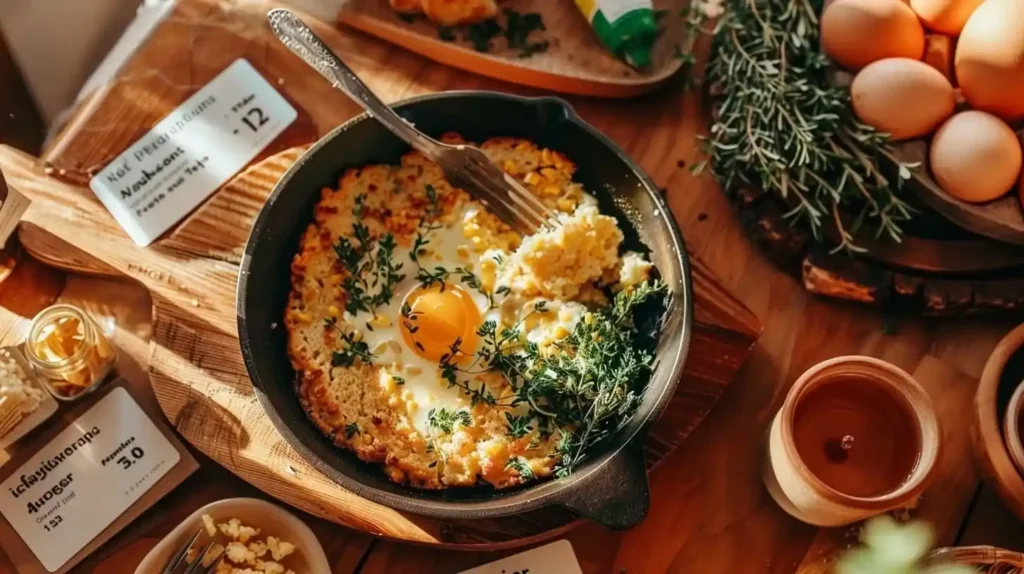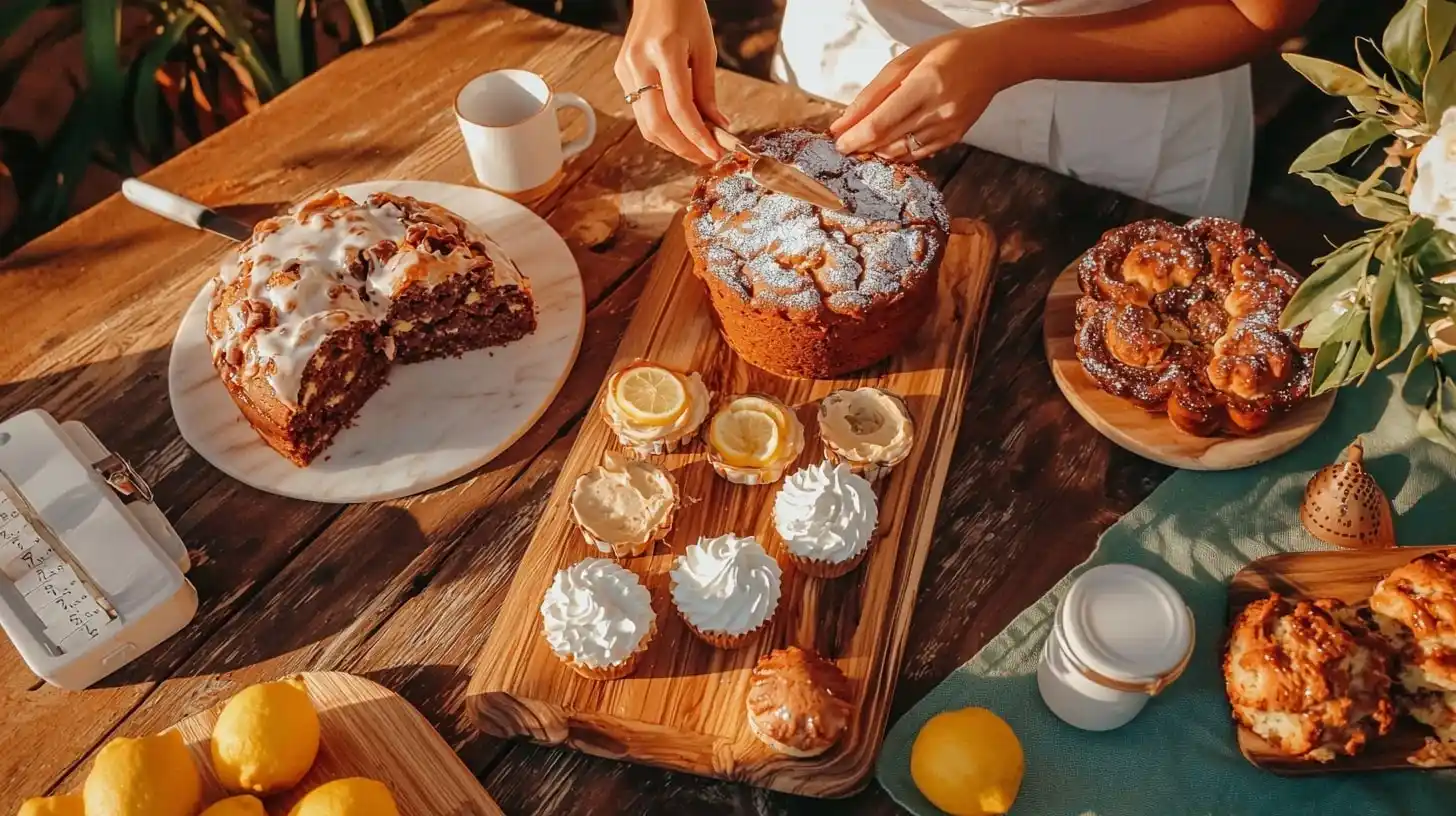My most memorable cooking lesson with my grandmother came on a rainy Saturday when I was eleven. We were making cornbread to accompany her famous vegetable soup, and as I cracked an egg into the bowl, my hand slipped, sending a second egg splashing into the mixture. I froze, certain I’d ruined our dinner. “I’m sorry,” I stammered, but my grandmother just smiled. “Actually, that’s my secret,” she confessed, her eyes twinkling. “I always add an extra egg to my cornbread. Watch how it turns out.”What does adding an extra egg to cornbread do?.
That accidental discovery became one of my most treasured culinary inheritances. The cornbread that emerged from her cast iron skillet that evening was notably different—richer and more tender than any version I’d had before. “What does adding an extra egg to cornbread do?” I asked her as we savored warm slices drizzled with honey. “It makes it special,” she replied simply.
Years later, as I teach my own children to bake, I’ve come to understand the science behind my grandmother’s “special” cornbread. That extra egg transforms ordinary cornbread in fascinating ways that go beyond just flavor.

Extra-Egg Southern Cornbread
Ingredients
- 2 cups stone-ground cornmeal
- 1/2 cup all-purpose flour
- 1 teaspoon baking powder
- 1/2 teaspoon baking soda
- 1 teaspoon salt
- 3 large eggs (instead of the traditional 2)
- 1 1/3 cups buttermilk (slightly reduced to balance the extra egg)
- 1/3 cup melted butter or bacon drippings
- 2 tablespoons butter for the skillet
Instructions
- Place a 10-inch cast iron skillet in the oven and preheat to 425°F."
- In a large bowl, whisk together cornmeal, flour, baking powder, baking soda, and salt.
- In a separate bowl, beat the 3 eggs lightly, then whisk in the buttermilk and melted butter or bacon drippings.
- ake a well in the center of the dry ingredients and pour in the wet ingredients. Stir just until combined – do not overmix.
- Carefully remove the hot skillet from the oven. Add the 2 tablespoons of butter and swirl to coat the bottom and sides of the skillet.
- Pour the batter into the hot skillet – it should sizzle as it hits the pan.
- Return the skillet to the oven and bake for 23-28 minutes (slightly longer than traditional cornbread due to the extra egg), until golden brown and a toothpick inserted in the center comes out clean.
- Allow to cool in the skillet for 5 minutes before cutting into wedges and serving.
Notes
Table of Contents
Why Understanding Egg Functions Matters
Learning what adding an extra egg to cornbread does helps you customize recipes to your preference. Here’s why this knowledge matters:
- Recipe adaptability: You can modify existing recipes to match your texture preferences.
- Problem-solving: Extra eggs can compensate for other ingredient shortcomings.
- Dietary enrichment: Eggs add valuable protein and nutrients to a primarily carbohydrate-based dish.
- Texture control: Understanding egg effects lets you achieve your ideal cornbread consistency.
- Regional adaptability: You can adjust Northern or Southern recipes to create your perfect hybrid.
While my best Southern cornbread recipe uses a traditional egg ratio, understanding how eggs affect the final product helps explain some differences between cornbread and Southern cornbread. These variations add wonderful diversity to our cozy breakfast recipes collection.
What does adding an extra egg to cornbread do? 5 Benefits

1. Creates a Richer, More Tender Texture
The most noticeable benefit when adding an extra egg to cornbread is the dramatically improved texture. The additional protein and fat from the egg yolk creates a more tender crumb structure that holds together beautifully when sliced yet remains delicately soft when eaten.
“Cornbread should hold its shape but melt in your mouth,” my grandmother would say, demonstrating how her extra-egg version didn’t crumble apart like many traditional recipes. Even when I make buttermilk cornbread, that extra egg works harmoniously with the buttermilk to create an incredibly tender texture that my family now considers the gold standard.
This texture improvement is particularly valuable for those who find traditional Southern cornbread too crumbly. The extra egg bridges the gap between authentic Southern recipes where Southerners don’t put sugar in cornbread and the more cake-like Northern versions, creating a perfect middle ground.
2. Improves Moisture Retention
What does adding an extra egg to cornbread do? for its shelf life? The additional egg significantly enhances moisture retention, keeping your cornbread fresh longer. The proteins in egg whites help trap moisture within the bread’s structure, while the emulsifying properties of the yolks help distribute that moisture evenly.
My mother, who often baked cornbread ahead for busy weeknights, discovered this benefit by accident when doubling a recipe but adding three eggs instead of two. “The cornbread was still delicious the next day,” she noted with surprise. This moisture retention makes extra-egg cornbread ideal for meal prep or when you want leftovers to maintain their quality.
For busy families, this moisture-preserving quality means you can enjoy quality cornbread without daily baking. I often make a large batch with extra eggs on Sunday, knowing it will stay deliciously moist through Tuesday’s meals.
3. Adds Valuable Nutrition
Beyond texture and moisture, an extra egg significantly boosts cornbread’s nutritional profile. Eggs contribute high-quality protein, B vitamins (particularly B12, which plant foods lack), vitamin D, and essential minerals like selenium and choline.
“Cornbread with extra eggs isn’t just tastier—it’s a more complete food,” my nutritionist sister explained when I mentioned my grandmother’s technique. This nutritional enhancement transforms cornbread from a simple side dish into a more substantial part of the meal, especially valuable when serving it as part of a vegetarian dinner.
For families looking to increase protein intake, this simple addition makes cornbread work harder nutritionally. I’ve found this especially valuable when making cornbread for my active teenagers, who need protein-rich options throughout the day.
4. Creates a More Substantial Rise
What does adding an extra egg to cornbread do? for its height? The additional protein in egg whites creates a stronger structure that supports greater rise during baking. The result is a loftier, more impressive cornbread that doesn’t sink in the middle—a common problem with many standard recipes.
“Watch how high it climbs,” my grandmother would say as we peered through the oven window. The extra egg provides more structure as the cornbread bakes, allowing the leavening agents to work more effectively without collapsing under their own weight.
This improved rise is particularly noticeable when making cornbread in larger, deeper pans. Where standard recipes might stay flat or sink in the middle, the extra-egg version rises proudly and maintains its height even after cooling.
5. Enhances Flavor Complexity
Perhaps the most subjective benefit is how an extra egg deepens cornbread’s flavor profile. Egg yolks contain fats that carry and enhance flavors, creating a more complex taste experience. The subtle richness doesn’t overpower the corn flavor but rather complements and elevates it.
“It tastes more complete somehow,” my husband commented the first time I served him my grandmother’s version. This flavor enhancement is difficult to describe but unmistakable when experienced—the cornbread tastes more satisfying and less one-dimensional.
For those who appreciate nuanced flavors, this benefit might be the most compelling reason to add that extra egg. It transforms simple cornbread into something worthy of being enjoyed on its own, not just as a vessel for butter or accompaniment to other dishes.
How to Add an Extra Egg Successfully
If you’re excited to try this technique, here’s how to incorporate an extra egg successfully:
- Maintain liquid balance: When adding an extra egg, you may need to reduce other liquids slightly (about 2 tablespoons less milk or buttermilk per extra egg).
- Mix gently: Extra eggs can develop more gluten when overmixed, so stir just until ingredients are combined.
- Watch baking time: Extra-egg cornbread may need an additional 3-5 minutes of baking time due to the added moisture.
Answers to Your Extra-Egg Questions
Q: Will adding an extra egg make my cornbread taste eggy?
No, unless you’re adding multiple extra eggs. One additional egg enhances cornbread’s natural flavors without contributing an obvious egg taste. My children, who detect and reject “eggy” flavors in other dishes, have never commented on it in cornbread.
Q: Does adding an extra egg work in both Northern and Southern cornbread styles?
Yes! In Southern-style cornbread, the extra egg adds moisture and tenderness without requiring sugar. In Northern-style sweet cornbread, it creates a more cake-like texture that many prefer. It’s a versatile improvement for both traditions.
Q: Can I use just an extra egg white or yolk instead of a whole egg?
An extra yolk will increase richness and tenderness, while an extra white will improve structure and rise with less richness. My grandmother occasionally used just an extra yolk when making cornbread to serve with spicy chili, creating a more decadent counterpoint to the heat.
I hope these insights help you understand what adding an extra egg to cornbread does for both the science and sensory experience of this beloved quick bread. Will you try this simple yet transformative technique in your next batch?
With warmth, Sophia





